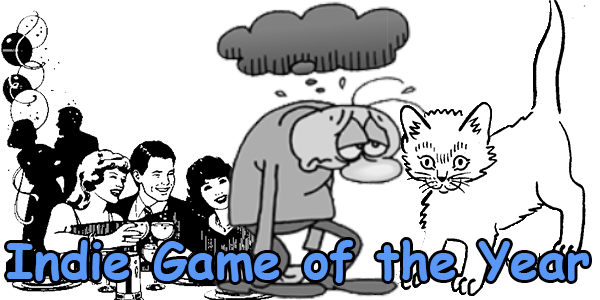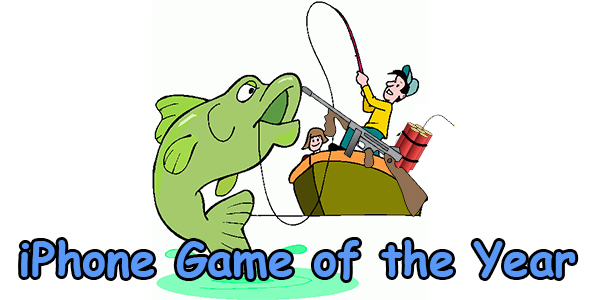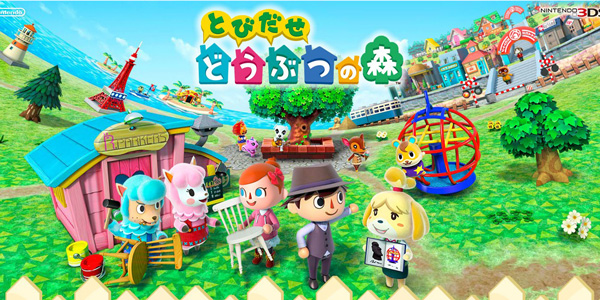They’re back.
How do you write about the best games of the year when you haven’t played them all – or you didn’t buy any? That’s easy: you just write about your favourites. These are ours. Welcome to the fourth annual Screenies!
After last year’s globe-trotting, special effects-laden video feature, we’ve had to work with a limited graphic design budget for this year’s awards. We’ve still done a great job of conveying the prestige and impeccable quality of The Screenies.
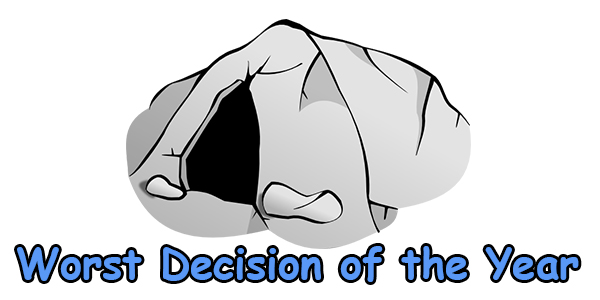
Craig: The most disappointing moment of the year occurs several times in The Cave, the adventure game from Ron Gilbert working alongside Tim Schafer’s Double Fine. Considering the calibre of creative minds it’s difficult to comprehend how The Cave is so poorly structured.
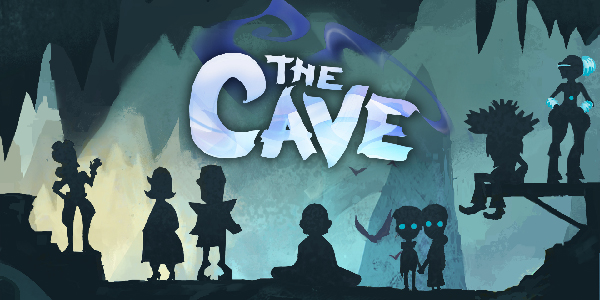
You pick three explorers from a choice of seven (first problem- we’ll get to this later) to usher through a magical cave that grants their deepest wishes in the evil genie way and not the blue, pop-culture spouting friendly genie way. The cave has a voice which makes a lot of bad jokes which I think were purposefully meant to be bad so on that front that’s a success I suppose.
Each explorer has a unique level to solve with generic levels interlarded throughout to form the award winningly dreadful structure:
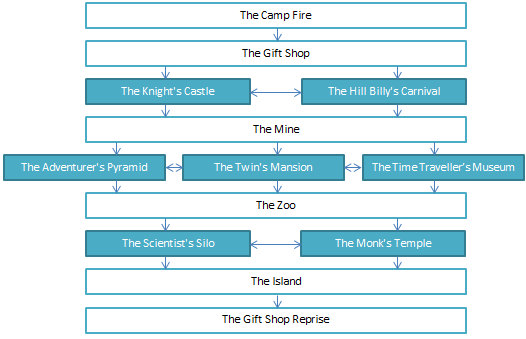
Playing all seven unique levels (blue boxes) therefore requires three separate playthroughs due to only shepherding three of the seven characters in a single playthrough. All those generic white boxes are hence visited three times with the final jaunt repeating two of the unique levels to boot.
The Cave is an adventure game of the puzzle solving variety. Static puzzles, in general, do not improve the second or third time they are solved. Unique levels do not become more unique upon their second viewing.
With the exception of the Time Traveller’s Museum which used a novel time-shifting mechanic to really interesting and fun effect, every other puzzle is grindingly mediocre. Repeated they become offensively so.
The three character concept was meant to bring balance to the Force adventure game, not destroy it. Independent characters elegantly bypasses the typical traipsing back and forth across locations and load screens in order to flip a switch way over there to open the door way over here.
Sadly however the trio of explorers are rarely deployed other than to hold switches (locking them in position) or to hold down a pressure plate (again locking them in position). Might as well have had to crates for companions with funny hats. Paint a heart on the side of them and boom we’re partying like it’s 2008.
But then as a final jab in the eyes, The Cave has a good and bad ending hidden in the final Gift Shop Reprise which involves disobeying an implied order three times or not. I only realised this because an achievement flashed up proclaiming I had “failed”.
Achieving the good ending for me then would involve playing the entire game, with multiple repeating levels for three times, for a second time. I just don’t have the time to waste on a game so hell-bent on wasting mine.
Alan: 2013 was the year when ‘indie’ ceased to mean anything. Like in the music industry, indie used to be the mark of a product without a mainstream publisher, but Steam Greenlight and phone app stores make this an increasing irrelevance. Are you still an indie if you’ve raised a million dollars on Kickstarter? Are Double Fine the Green Day of the games industry? As usual, I am a lot more interested in games than dull semantics.
Depression Quest is a game that places you inside the mind of someone suffering from depression. Its power comes from its subversion of the videogame’s idea of choice and agency: what conveys the reality of the illness better than striking out options in a selection window so that you’re aware of them, but they remain unavailable to you?

The fizzing static and Isaac Schankler’s subtle soundtrack put you into a state of mental fuzziness and unease, where every difficult decision leads to dreading another difficult decision. It’s not fun; it’s exhausting. It’s an education. It’s a great use of Twine besides hyperlink-riddled poetry. While no one game could cover the totality of depression, Depression Quest convincingly portrays some of it, and that is a worthwhile endeavour.
Depression Quest is free to play on the website, but I paid for it and you should too.
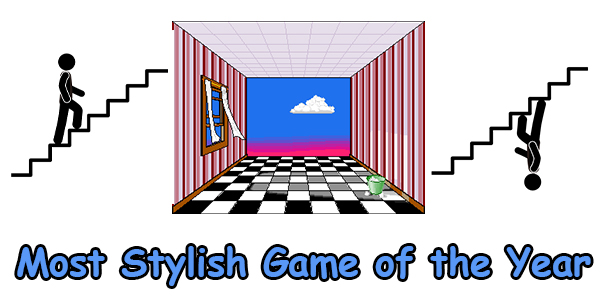
Craig: I studied Physics with Music at university. As a degree it was nonsense to the extent it doesn’t exist anymore. But for me it was both left- and right-brain bliss. This year Antichamber brought a similar head-buzzing euphoria.
While Q.U.B.E. (reviewed here) walked in the shadow of Portal and Quantum Conundrum tripped itself trying to replicate Portal, Antichamber is a first person puzzler that surpasses Portal in creating an intricate, impossible world that delights at each nonsensical turn. Its playfulness in tricking the senses with non-Euclidean structures and lateral puzzle solving is so expertly judged. The Stanley Parable (early mod review here) plays a similar trick but in a purposefully brash and a loud mouthed style.
Style. That’s the word. Antichamber is the most stylish game of the year.



Sparse white walls splashed with vibrant, bright colours alternating between crisp natural soundscapes and an ambient moodscape that builds. It’s a work of digital art.
I’m using very effusive language, I know, but I’m happy to do so because the game itself is so understated. I’ll let you search for a gameplay video yourself, and instead I’ll throw up a comparison to French magician Yann Frisch’s take on the classic cups and balls. It’s the same wordless magic I found in Antichamber.
Alan: Ridiculous Fishing is “a tale of redemption”, but that has two meanings. The game’s story is The Old Man and The Sea with rocket launchers, but there’s also the behind-the-scenes story of Vlambeer’s redemption, detailed in this article at Polygon. It’s great to see Ridiculous Fishing finally released, but even better that it’s a great game.
It’s really three games in one: your lure paradoxically avoids every fish on the way down, thrusting down to catch the most exotic fish, but once one takes the bait it becomes a battle to collect as many as possible before your rod reaches the surface, spilling your catch into the air, and Billy whips out a shotgun to blast them apart for cash. Each new fishing hole brings increasingly preposterous fish and weapons until your lure spits saw blades and has a toaster dangling from the line to avoid accidental bicatch.
In a year when microtransactions ruined console games such as Forza Motorsport 5 just like they’ve tarnished mobile, it’s great to see developers who still believe in the purity of a game as a finished and uncomprised work. Ridiculous Fishing provides the best of all mobile games: an endless game that can be completed; unlockable equipment unburdened by microtransactions; a game that’s as long as the Mariana Trench yet short enough to play on the toilet.
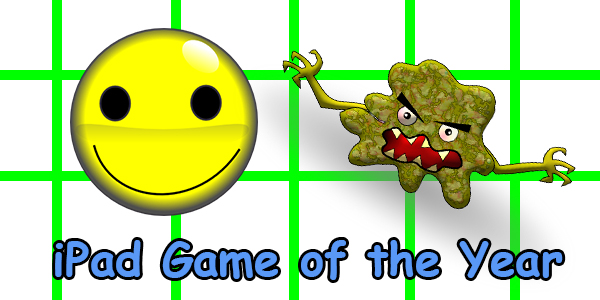
Alan: “868-HACK is really special, but I couldn’t for the life of me tell you why,” writes Brendan Keogh in issue #5 of Five out of Ten. Michael Brough’s hacking roguelike/procedural death labyrinth is simple to describe – it’s a computer grid gauntlet populated with viruses that a player must overcome through strategy and guile – but somehow inscrutable. It’s not enough to unthinkingly dash through each room, as you’ll be eliminated by a daemon or glitch in seconds. You must continually ask yourself: what’s going on here? Why am I dead? Again?
I came to appreciate procedural death labyrinths a little more this year. Derek Yu’s Spelunky has a similar goal to 868-HACK: to force a player to learn its systems, rather than relying on luck or muscle memory. Procedural generation allows for a different kind of skill than the games of old. Rather than learning patterns of platforms, we must now learn patterns of behaviour. Rather than the linear corridors of a first person shooter’s campaign, think of the unpredictable arenas of multiplayer.
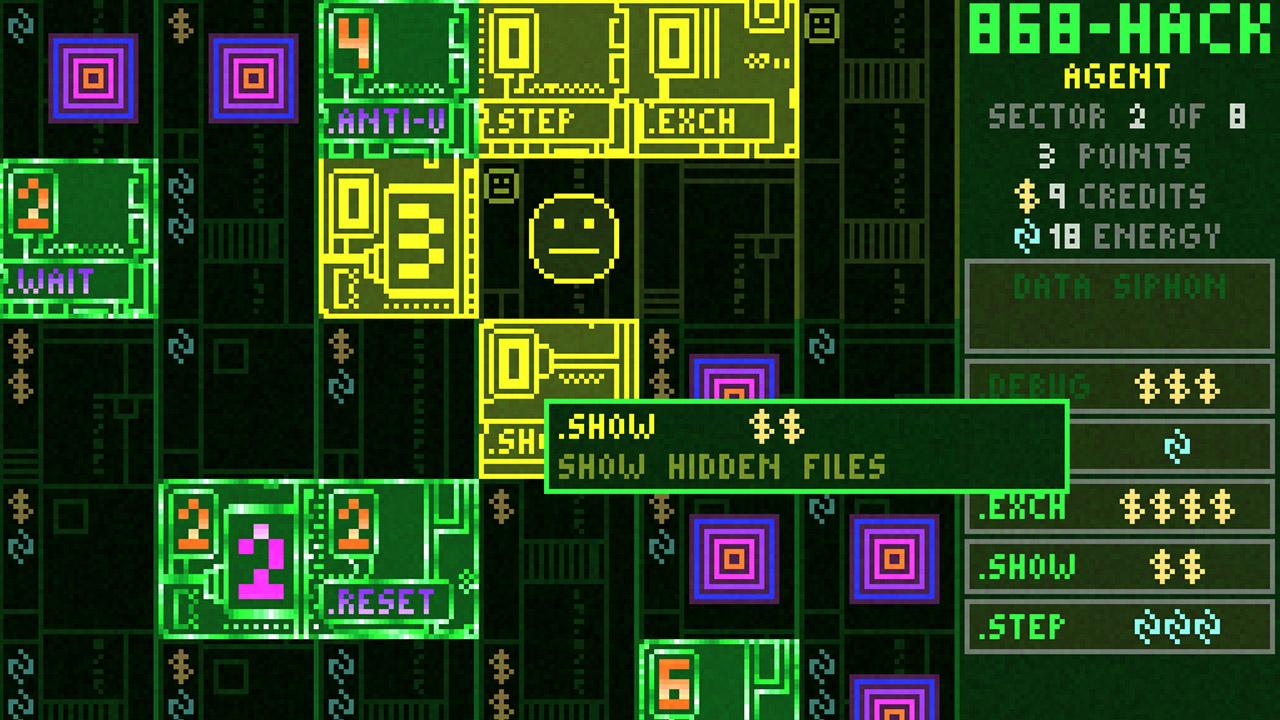
The learning curve is steep, but the rewards are sweet. Yet completing 868-HACK is not the same as mastering it, as each new game unlocks different programs to utilise in strategies. For everything you figure out, there’s something new to learn. If you were alienated by Brough’s bizarre puzzler Corrypt, this is much more worthy of your time. It is clever and compelling, even when you are wiped out for the fifth time in a row.
868-HACK is really special, but I couldn’t for the life of me tell you why.
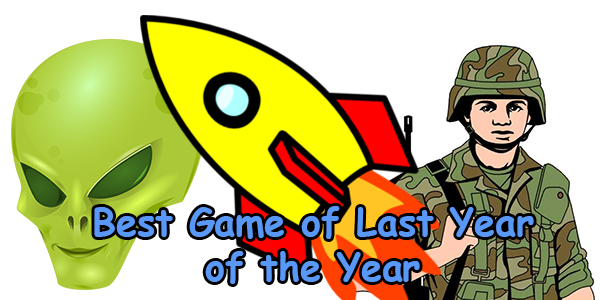
Craig: The nice thing about reviewing a game a year after its release is that all the obvious points have already been made. Hopefully.
I imagine in other reviews – on other sites admittedly so banish that thought from your mind for the time being – you’ll find many, many words expounding on XCOM’s cleanly designed interface and smooth introduction of tactical elements. It sits wonderfully alongside Civilisation IV in the “Just One More Go” brainwashing cult.
The reason why I enjoyed it so much will now be written in small font in order to save myself some self-respect: XCOM makes me feel like a badass.
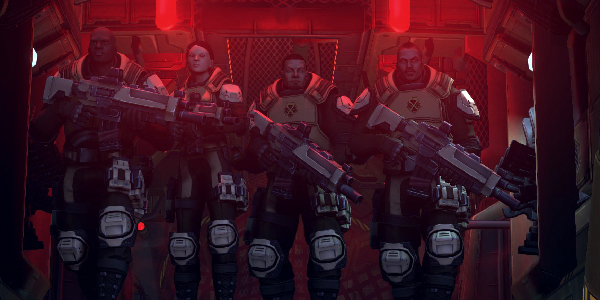
It’s shameful really. It’s wholly generic sci-fi: generic invading aliens against Earth’s secret (and generic) military organisation.
I shouldn’t get as pumped up picking my squad (I blame the music), I shouldn’t devote so much time naming them (I blame myself for writing family trees) and I shouldn’t then become so attached to my alpha team that I’ll repeat missions not because I failed them but because I know I could do better.
My alpha team could do better and that soft, acrylic Earth deserved better.
In short it’s a turn-based tactical squaddy shooter and it’s totally badass.
Alan: Animal Crossing: New Leaf offers a holiday any time you want. Escape from the banality of your daily grind to a town filled with friendship and fishing, where money grows on trees and dinosaur fossils are buried in the soil. A place where the only jobs are the ones we concoct for ourselves, where materialism is so rampant that it loses all meaning. If the ultimate aim of The Sims is to create an exaggerated microcosm of life, then Animal Crossing aims for utopia instead.
After years of iterative sequels that didn’t add much to the Animal Crossing formula, New Leaf’s title can be taken literally. It feels like the way the game was always meant to be, with the online connectivity and sheer portability of the 3DS providing a holiday destination you can share with your friends and carry in your pocket. It takes advantage of the 3DS’s Streetpass and online functionality to bring a world of villages together in a way its DS and Gamecube predecessors never could.
Unlike The Sims, time in Animal Crossing passes in your absence. You’re a mayor, not a god, and the game gives back only to those who will put in the hours. That’s why it is so essential that the game is on a handheld console: untethered from a TV, free to pause at any time by closing the 3DS, you can visit your village whenever you like rather than whenever you’re in the living room and have two free hours.
I haven’t played New Leaf since Pokémon X was released, but I hope to return to Oinktown soon. In a remarkable year for the 3DS, when its status shifted from ‘compelling’ to ‘essential’, New Leaf is a standout title.
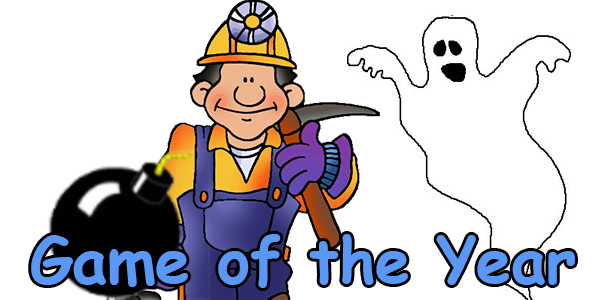
Alan: At the inaugural Screenies, I made a mistake. I voted with my head for Mass Effect 2 as Game of the Year, but my heart belonged to Bayonetta. Voting head over heart is disingenuous; the games that truly matter are the ones that capture our hearts. You need to use both! There has been a change in thinking recently, where ‘Game of the Year’ lists have been populated with indie releases like Gone Home that are more meaningful than merely technically impressive (I loved Gone Home, it just didn’t make this shortlist).
So it’s time to vote with both my head and heart this time: my Game of the Year for 2013 is Spelunky.
“Wait a minute! That game came out in 2012!” I hear you cry. While Spelunky was originally released for free a few years ago, and its HD remaster reached the Xbox 360 last year, it’s only with its appearance on the PC, PS3 and Vita that Spelunky’s true brilliance was revealed – for me, at least.
Spelunky is a hard game. It’s not uncommon to die on the first stage, even with twenty hours of experience under your belt. I died 167 times on the PC version before defeating Olmec, and I’ve never faced him again. While it’s possible to learn your way through the game with trial and a lot of error, it’s more enjoyable and much quicker to learn through Lets Play videos. That’s where the Daily Challenge comes in.
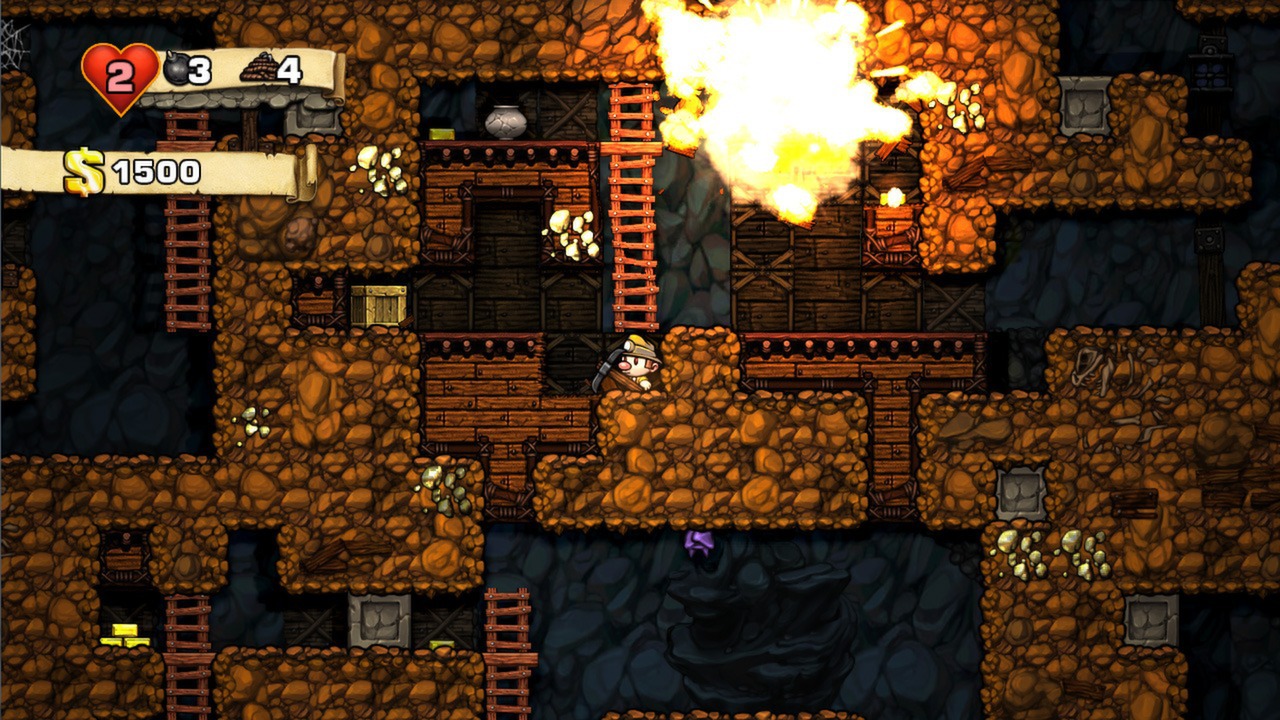
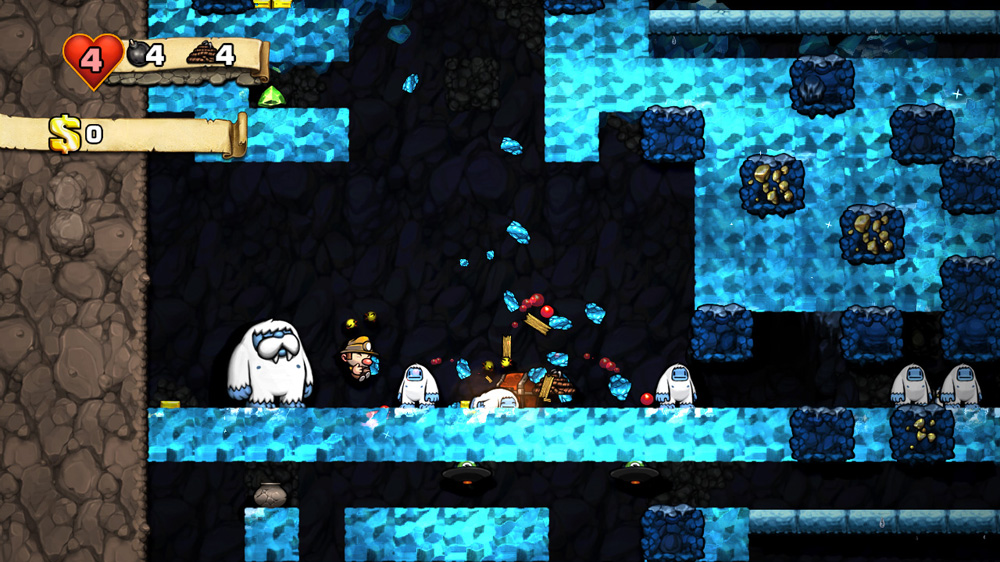
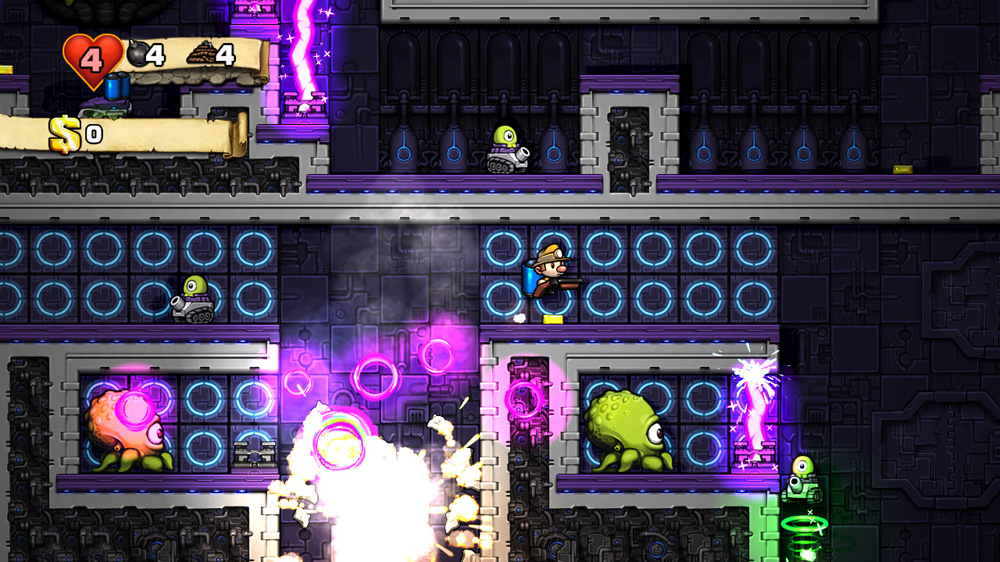
2013 was the year of the ‘indie’, but also the year of the broadcast. Streaming services like Twitch became more popular than ever. It’s no coincidence that the PlayStation 4 has streaming functionality built-in: every game can be watched by someone else, every personal moment can be shared online until it is utterly impersonal. An endless sea of digital memories, shared to everyone, mattering to no one.
Spelunky’s Daily Challenge, however, gives meaning to random streaming – and meaning to the game’s innate randomness. Every day, all players get one attempt at the same level. Once the Spelunky Explorers Club was founded, dedicated to sharing YouTube replays of Daily Challenges, things got really interesting. Players narrated their strategies as they played. I’d watch a couple and then see if I could avoid the mistakes of others. You were able to share in the same drama and challenges as other players without feeling like you’d had an unlucky roll of the die (no pun intended), because you’d seen them achieve what seemed impossible. It was fitting that when I first saw Olmec sink into the lava without the macroblocking artifacts of YouTube, it was on a Daily Challenge level.
Like 868-HACK, Spelunky is a game about systems. It’s a perfect balance of equipment, enemies and generated levels that lends itself to wonder and head-shaking hilarity. It’s often cruel, and has a wicked sense of humour, but is rarely unfair – Spelunky aficionados use the term YASD, for ‘Yet Another Stupid Death’, and after a few games you’ll understand why. Like chess, you need to think a few moves ahead to anticipate the reactions of monsters and traps. It’s not possible to predict everything, even if you’re a Spelunky grandmaster, but there’s a consistent logic to it. It wouldn’t really work unless it was a masterpiece of algorithms, rules and variables. Not all of these are explicitly quantified: you just know they’re in place, holding the universe together.
Twenty hours of play later, the City of Gold is still undiscovered; and in the bowels of Hell, King Yama’s Throne is unconquered. I’m still playing Spelunky. I should probably play something else.
The heart wants what the heart wants.
Relive the glory of years gone by:
The Screenies 2012 (video feature)
The Screenies 2011
The Screenies 2010


